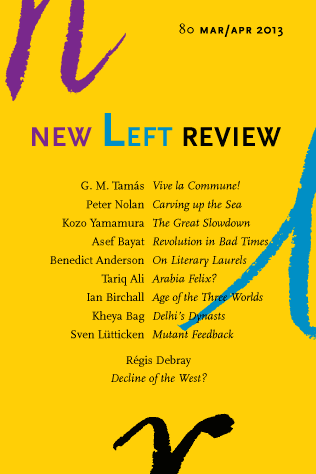A dissident philosopher traces his path from Ceaușescu’s Romania to Orbán’s Hungary, and from liberalism to Marxism. Memories of a vanquished world and premonitions of a bleak future in Eastern Europe, amid a downgrading of citizen equality.
Mired in recession at home, pledged to perpetual warfare on the periphery—in what shape is the global sheriff? Régis Debray draws up a balance sheet of its vital symptoms.
Euphoric celebrations of the Arab uprisings have skated over their profoundly ambiguous character. Asef Bayat explains the failure to make a clean sweep of the old order in terms of a self-limiting programme that stems from the discredit of traditional revolutionary models.
Responding to Asef Bayat, Tariq Ali argues that any adequate analysis of the outcomes of the Arab Spring must reckon with Washington’s tight defence of its interests in the region. The dynamics of the revolts located in a long history of Western intervention.
While China’s maritime aspirations have been widely criticized, little attention has been paid to the UN compact that guarantees Western imperial powers exploitation rights over vast expanses of the world’s oceans.
Capricious patterns of distribution for the Nobel prize in literature as a reflection of changing geo-political currents, from belle époque to Cold War to globalized present.
Relations between TV and performance art since the 1960s as a tangled skein of complicity and contestation. Sven Lütticken traces shifts in modes of acting, working and self-presentation, within a televisual world itself now being absorbed by cybernetic and digital systems.
Kozo Yamamura on Tyler Cowen, The Great Stagnation. Can flagging growth in the US be explained by closing technological frontiers?
Kheya Bag on Rani Singh, Sonia Gandhi: An Extraordinary Life, An Indian Destiny. Flacking for the world’s longest-running electoral dynasty.
Ian Birchall on Christoph Kalter, Die Entdeckung der Dritten Welt. The French left’s discovery of the Third World.
